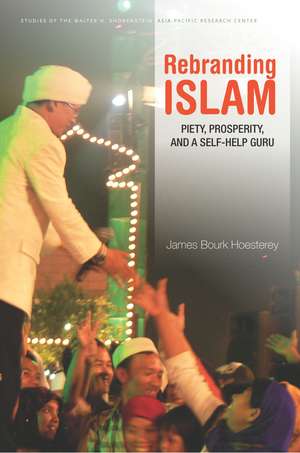Rebranding Islam: Piety, Prosperity, and a Self-Help Guru: Studies of the Walter H. Shorenstein Asi
Autor James Hoestereyen Limba Engleză Hardback – 10 noi 2015
At Gymnastiar's Islamic school, television studios, and MQ Training complex, Hoesterey observed this charismatic preacher developing a training regimen called Manajemen Qolbu into Indonesia's leading self-help program via nationally televised sermons, best-selling books, and corporate training seminars. Hoesterey's analysis explains how Gymnastiar articulated and mobilized Islamic idioms of ethics and affect as a way to offer self-help solutions for Indonesia's moral, economic, and political problems. Hoesterey then shows how, after Aa Gym's fall, the former celebrity guru was eclipsed by other television preachers in what is the ever-changing mosaic of Islam in Indonesia. Although Rebranding Islam tells the story of one man, it is also an anthropology of Islamic psychology.
| Toate formatele și edițiile | Preț | Express |
|---|---|---|
| Paperback (1) | 162.45 lei 22-36 zile | |
| Stanford University Press – 10 noi 2015 | 162.45 lei 22-36 zile | |
| Hardback (1) | 618.39 lei 43-57 zile | |
| Stanford University Press – 10 noi 2015 | 618.39 lei 43-57 zile |
Din seria Studies of the Walter H. Shorenstein Asi
-
 Preț: 198.43 lei
Preț: 198.43 lei -
 Preț: 266.00 lei
Preț: 266.00 lei -
 Preț: 202.16 lei
Preț: 202.16 lei -
 Preț: 173.51 lei
Preț: 173.51 lei -
 Preț: 163.49 lei
Preț: 163.49 lei -
 Preț: 158.35 lei
Preț: 158.35 lei -
 Preț: 162.45 lei
Preț: 162.45 lei -
 Preț: 173.10 lei
Preț: 173.10 lei -
 Preț: 200.17 lei
Preț: 200.17 lei -
 Preț: 178.69 lei
Preț: 178.69 lei -
 Preț: 520.97 lei
Preț: 520.97 lei -
 Preț: 266.31 lei
Preț: 266.31 lei -
 Preț: 247.40 lei
Preț: 247.40 lei -
 Preț: 481.09 lei
Preț: 481.09 lei - 19%
 Preț: 645.98 lei
Preț: 645.98 lei -
 Preț: 211.68 lei
Preț: 211.68 lei
Preț: 618.39 lei
Preț vechi: 763.44 lei
-19% Nou
118.33€ • 123.88$ • 97.91£
Carte tipărită la comandă
Livrare economică 07-21 aprilie
Specificații
ISBN-10: 0804795118
Pagini: 296
Ilustrații: illustrations
Dimensiuni: 152 x 229 x 23 mm
Greutate: 0.52 kg
Editura: Stanford University Press
Colecția Stanford University Press
Seria Studies of the Walter H. Shorenstein Asi
Recenzii
Notă biografică
Cuprins
The Introduction frames the book in terms of the anthropology of psychology and it within theoretical conversations concerning religious authority, Muslim subjectivity, and the cultural politics of public piety. It argues that Aa Gym garnered religious authority through adept use of media and the deliberate cultivation of his personal brand in the religious marketplace of modernity. His authority was marked by distinctive affective and economic relationships between preacher-producer and consuming devotees. It also argues that Islamic self-help psychology promotes models of personhood that are commensurate with, but cannot be reduced to, neoliberal logics of self-enterprise and democratic notions of civic virtue. Aa Gym also leveraged his public pulpit into political voice in an attempt to discipline state actors during the drafting of controversial anti-pornography legislation. The Introduction argues that scholarly understandings of political Islam must focus on popular culture, not simply electoral politics and formal institutions.
Known across the Indonesian archipelago as a shrewd entrepreneur, doting husband, and virtuous family man, Gymnastiar legitimated his claim to religious authority through his ability to market himself as the embodiment of Islamic virtue. This chapter///////





















